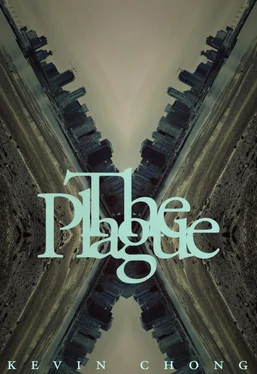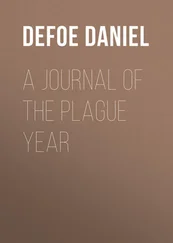Tso explained the situation, hoping not to alarm Khan. “We’re going to clean Mr Grossman’s place,” she insisted. “Just be careful.”
Khan threw his hands up to his cheeks; he seemed unconcerned about infection. “This poor woman. What a good man. And she is a loyal daughter,” he told Tso, suddenly sounding older than he was. He moved a little closer toward her and said in a whisper, “If there is anything you need—because right now, there are so many shortages—just ask me. I can help. Anything to return the favour.”
He left the bottle of vodka and the brown paper package with Tso. Within the package were two frozen wild salmon steaks.
“I don’t know what he’s doing—but he’s already paid four months of back rent,” Grossman explained upon waking. “And I have never seen him happier. He must be the happiest man in the city.”
“All it took was an epidemic,” Tso replied with a whistle.
“When you think of it, the disease puts everything in perspective,” Grossman added before breaking into the first of many teary jags. Tso brought her water and a Benadryl.
Once Grossman was asleep again, Tso left to retrieve her toothbrush from the hotel and returned with vegetables and rice to serve with the salmon steaks. Then she picked the best Netflix indie romantic comedies. She felt useful.
Grossman had an appointment at a funeral parlour for the next day. Tso accompanied her. When they arrived, they were asked to wait in a reception area that was so crowded they needed to stand. They waited forty-five minutes until a funeral services agent, a dewy-faced young woman who shared a surname with the business, welcomed them into her office. She apologized for the delay. “As you can see, we’ve had a lot of appointments.”
Grossman handed over her prepaid policy papers and began listing her specific needs. Her father didn’t want a religious funeral; he had disavowed Judaism as a teenager. He wanted laughter. “It should be in a small room, as my dad kept to himself in his later years,” she continued. “And I want a cherry oak casket.”
The funeral staffer’s eyes flitted between the contract that Grossman brought and her computer screen. “I’m afraid we have a problem,” she said, turning back from the screen. “At the moment we only have the capacity to do cremation burials.” They had run out of caskets; new inventory hadn’t yet been brought in. And they had no idea when they might get caskets.
“But my father has a full-sized plot,” Grossman said.
“That’s wonderful,” the agent said matter-of-factly. “You’re lucky to have had a parent who planned so well. Dad left you with so many options.”
The single plot (purchased, along with the funeral, in a lugubrious period following Izzy Grossman’s second divorce) could be subdivided. Some of it could be reserved for Janice or her sister. Or she could sell the land, which had a prime location in the city’s only cemetery, Mountain View. The value of the land, mirroring residential property, had grown exponentially in the past year. And then there was the “plague premium.” As it stood, with other cemeteries outside the city limits, there were bodies and cremated remains that would not be buried until the quarantine was lifted. Muslim and Jewish families, whose faiths did not allow for cremation, were most grievously affected. Mr Grossman’s plot was a prize. “In this market,” the agent concluded, “you would make a killing.”
Grossman pulled her grey curls over her face and rocked in her chair. Tso leaned into her and asked if she wanted to go. Grossman shook her head. “I just thought this would go more smoothly,” she whispered back. “I don’t need to turn a profit.” She took a breath and asked the funeral agent if they could build their own casket.
“From pine?” the agent asked. Her placid demeanor was suddenly transformed, and she re-clicked her computer mouse as though she could regain her composure through repetition.
“I would have to find a carpenter,” Grossman answered. “But we would use better material.”
The agent excused herself. “I’m sort of new here,” she told them. “I need to consult with my manager.” She returned five minutes later, a smile reapplied to her face, and told them that a homemade casket would work.
For Grossman, the job of building a casket offered a diversion from the more mundane tasks of funeral planning and excavating her father’s apartment. When they got home, Grossman called a friend, a cabinetmaker, to commission the project. But this friend was preoccupied by the illness of her wife, who had been admitted to the auxiliary hospital the day after Grossman’s father. She then called a contractor only to be told that he was booked solid. Since the quarantine, some homeowners had thrown themselves into renovations and other time-consuming improvement projects. They surmised that the city was too preoccupied to notice that this work was being done without permits. And they had nothing better to do.
“That leaves us with one option,” Grossman said. She then committed to building her own casket for her father. For half of that day, she was engrossed in the project, following online instructions for a “toe-pincher” style pine coffin. She and Tso went to the hardware store to collect the boards, handsaw, nails, wood glue, clamps, and rope. Grossman put it together in the former grocery store that had once been Janet’s art studio. The ice-frosted windows of the store allowed in more light than Tso expected and was reflected in the polished wood floors. On the interior walls, some oil paintings by Grossman’s former lover still hung. In those paintings, Grossman was depicted fully clothed—not as a figure of beauty but a dominating presence. In one image, she was pictured as a herder in a field of goats. In another, she leaned into a pool table lining up a shot. “I’ve been meaning to send those back to Janet,” she said once she noticed Tso looking at the paintings. “She wants to burn them. She says the style is too primitive. And that she used Indigenous imagery that might be considered appropriative. She’s worried I’ll ruin her career,” she added, measuring the casket’s centre floorboard. “What she should really be worried about is the novel I’m writing. It’s in the fantasy genre to avoid defamation, but it’s really about her.”
By nightfall, Grossman and Tso had put together the pine casket. The website suggested that it could also be used as a stage or Halloween prop. When they were done, they had realized that promise. It looked like something without being that something. Grossman sobbed at the result. “We’ll figure out an alternative,” Tso told her. She led her upstairs and back to sleep.
That evening, Tso allowed Grossman to spoon her until she began to snore. Once she detached herself, she stepped out of the apartment, across the landing, and knocked on Farhad Khan’s door.
“Ah—my saviour!” Khan shouted. He was bare-chested, in a pair of running shorts. “Please, come in.”
The front hallway to the apartment was lined with liquor boxes and cartons of cigarettes. Tso walked by the kitchenette where she had found him after his suicide attempt. The upturned chair remained on the checkerboard floor. “You seem to have some new business concerns,” she said.
“Yeah, I have some friends who fix me up,” he said, flopping into the middle of a couch. She couldn’t help noticing that he had the torso of a swimmer: a tanned, hairless inverted triangle. The torsos she’d seen most recently had all been narrow, wiry, and tattooed. Between the couch and a large television playing cable news, she saw a hookah. “You smoke?” he asked.
“Not in a long time,” she said, remembering a trip to Istanbul as a backpacker. She sat across from him in a matching armchair that she didn’t remember from her last visit. He huffed the hookah pipe, blowing smoke that made his eyes water, and passed it to her.
Читать дальше












